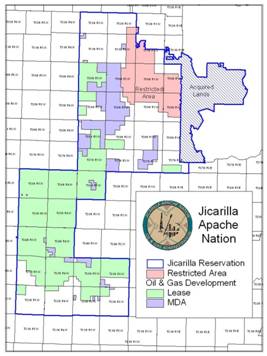| University of Colorado at Boulder |
 |
Jicarilla Apache Laws
Tribal CodeThe entire Oil and Gas Code can be found here with the most relevant provisions below. § 18-1-3 Oil and Gas Operating Permit Required - No person shall engage in any oil and gas activity within the Nation without first obtaining and maintaining in good standing an oil and gas permit. § 18-1-4 Application for Oil and Gas Operating Permit -Every person applying for an oil and gas operating permit shall submit to the OGA proof of bonding. § 18-1-5 Conditions of Permit - Each oil and gas operating permit shall contain the following conditions.
§ 18-1-6 Suspension or Cancellation of Permit - The Jicarilla Apache have a conditional oil and gas operating permit process pursuant to the Tribe’s oil and gas code. The applicant must have proof of adequate bonding as required by the Tribe. All oil and gas operations must also be conducted to give preference to Indians in employment and contracting as required by Jicarilla Apache and United States law, or by lease, contract, or other agreement with the Jicarilla Apache Nation. § 18-8-1 General Surface Stipulations - The Jicarilla Apache also require reclamation of oil and gas sites with further development will not occur within twelve months of the lease termination. Reclamation involves restoring lands to grades approximate to original contours and to conditions capable of supporting the activity the land was capable of supporting before the oil and gas development occurred. The ordinance uses a CERCLA-type liability scheme to hold all owners jointly and severally liable for reclamation costs. § 18-13-6 Development Plans - Comprehensive development plans are also required for oil and gas operations by some tribes, such as the Jicarilla Apache. In addition to all federal environmental assessment regulations, the Tribe requires that each lessee, sublessee, assignee, contractor, subcontractor, or operator to file a plan of development with the Tribe. The plan must include well locations, drilling schedules, pipeline locations, road locations, and locations of other surface removal activity. The plans must be approved by the tribal council and are considered an additional stipulation of the lease between the operator and Tribe. Federal RegulationsIn addition to their own regulations the Jicarilla Apache adopted the following federal regulations: 25 CFR Part 162 Leases and Permits – Stipulates requirements for the lease or possession of Indian land. 25 CFR Part 169 Rights-of-Way Over Indian Lands – Describes the procedures, conditions, and conditions of establishing rights of way. 25 CFR Part 216 Surface Exploration and Reclamation – Provides for the protection and conservation of mineral and nonmineral resources on Indian lands. Court CasesIn 1982 the United States Supreme Court explicitly ruled that the tribe had the authority to impose severance taxes on reservation oil companies in Merrion v. Jicarilla Apache Tribe.
Last substantive additions:
Last minor update: |
 The Jicarilla Apache reservation is located in northern New Mexico. Almost 3,000 members live on the 1,364 square-mile reservation, with the majority living near Dulce, the capital of the nation.
The Jicarilla Apache reservation is located in northern New Mexico. Almost 3,000 members live on the 1,364 square-mile reservation, with the majority living near Dulce, the capital of the nation.